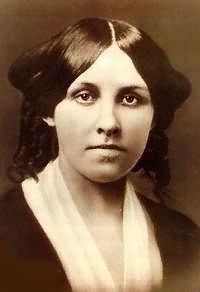Early Life
Louisa May Alcott was born on
November 29, 1832 in Germantown, Pennsylvania. Bronson Alcott was a philosopher
and teacher while her mother Abigail May was a fervent Christian. She had three
sisters, Anna, Elizabeth, and May, and was second to the oldest out of her
siblings. Due to her father’s Transcendental beliefs, Louisa grew up in an
intellectual and nontraditional environment. She lived primary in Boston and
Concord, moving around frequently between the towns.
Education
Louisa was taught by her father
until 1848. She also briefly attended a school in Still Rive Village and was
informally taught by some of the nation’s great thinkers such as Ralph Waldo
Emerson, Henry David Thoreau, Nathaniel Hawthorne, and Margaret Fuller.
Civil War
During the Civil War, Louisa served
as a nurse. As a nurse, she suffered from mercury poisoning when she contracted
typhoid fever and doctors used calomel, which contained a large amount of
mercury as a medicine. She felt the effects of this throughout here.
Career as a Writer
Even before this, writing was
always Louisa’s passion. Her career as an author began when she wrote poetry
and short stories that were published in magazines in 1851 under the pen name
Flora Fairfield. In 1854, at the age of twenty-two, her first book, Flower Fables
was published. Eight years later, she adopted the name A.M. Barnard and in
1863, published Hospital Sketches. Hospital Sketches was Louisa’s account of
her Civil War experiences especially based on the letters she sent as a nurse.
This work confirmed her desire to become a serous writer.
Afterwards, Louisa began to publish
her real name. In addition, in 1868, she became the editor of a girls’ magazine
called Merry’s Museum. At the age of thirty five years old, at her publisher’s
request for a girls’ book, Louisa wrote Little Women from May to July 1868. Set
in Civil War time England, Little Women was her most popular book and was based
on Louisa and her sisters’ coming of age. One of the notable characters was Jo
March, the first young American heroine to act from individuality. Louisa created a realistic character in
Jo rather than an idealized stereotype.
Little Women’s success gave Louisa
financial independence and demand for more books. Most of her next books were
for young people and inspired by her own life. Her other works include Little
Men (1871), Eight Cousins (1875), Jo’s Boys (1886), Work (1873), and
Mephistopheles (1877).
Later Life
Louisa was also a staunch supported
of women’s suffrage and temperance. However, her personal life was rather tumultuous
because she was frustrated with her father’s impracticality as a
Transcendentalist and her being constantly ill due to mercury poisoning. She
died on March 6, 1888 and was bureid in Sleepy Hollow Cemetery in Concord.

